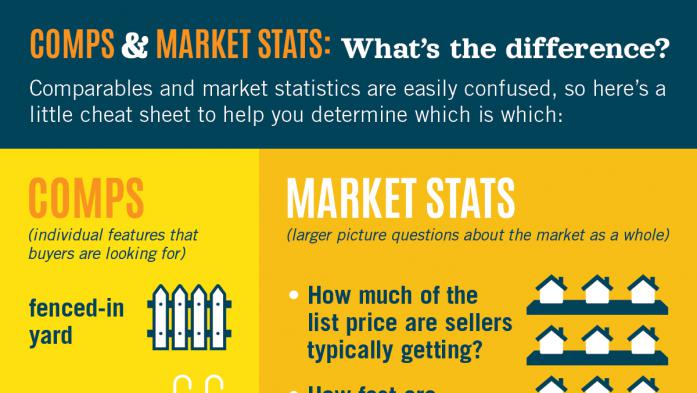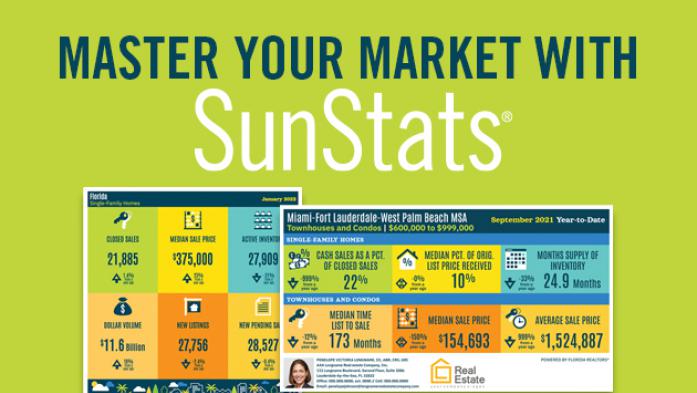
Real Estate Market Stats vs. Comps: What’s the Difference?
Comps & Market Stats: What’s the Difference?
Realtors know the ins and outs of comps — what they are, why they are important in every deal, and how they set the price and tone of the transaction overall.
But how do comps compare to market statistics, and more importantly, when should you look to one over another?
- COMPS: This stat helps consumers who have already decided to buy something evaluate the different options on the market; helps a seller understand how their product stacks up compared to other products currently “on the shelf”
- MARKET STATS: These help professionals gauge the health of the marketplace overall and to set expectations throughout the transaction for both buyers and sellers. Helps them communicate how competitive the marketplace is, how pricing is trending, whether the marketplace favors buyers or sellers, how quickly assets will move.
Comps: The value of features to individuals
To help understand, let’s consider a near-universal experience: buying a new vacuum cleaner.
When you go to Target to buy a vacuum, you stand in front of the options on the shelf and start comparing features and evaluating price, looking for the machine that will ultimately suit your specific needs. A person standing next to them is likely doing similar calculus but could come up with a different purchase based on their individual needs.
A pet owner may require certain tools and features that a person without pets doesn’t need. An older person may need a lighter machine, which could cost more, whereas a young college student doesn’t mind the cheaper, bulky model.
The one thing that unites every consumer in the market for a vacuum is that they are in the market for a vacuum. Value is placed on aspects of each machine based on their specific needs — what matters to one person may not to another. That’s why people are willing to pay different prices based on the different features that matter to them.
Comps are similar — they look at the individual features of houses that have recently sold very close to the area of the house in question. Features are compared: Does this house have a pool, a view, a yard, any major appliance upgrades, etc.? All of these features can add to the perceived value of the home — depending on if buyers are willing to pay more for them.
What matters to one buyer may not to another who would not be willing to pay extra for that particular feature. Someone with a more limited budget may be more willing to compromise on features just to purchase a home. Another person cannot live without certain things and are willing to pay more for what they want.
Either way, comps look at specific properties in a very small area and compare them to one another at a particular moment in time.
Comps are used to set the list price of a home and help sellers know how their property stacks up compared with other homes that recently sold. Comps matter most to people who have decided to actively participate in the market or have made the decision to buy or sell.
Market stats: Housing as a commodity
Market statistics elevate above the individual and consider the marketplace in general, looking at the health of the buyer and consumer and their ability to participate in the marketplace.
Continuing the vacuum-cleaner analogy, market data helps answer some of the following questions:
- How many people are in the market for vacuums?
- Do people have the money to purchase high-priced models or more entry-level models?
- How many other models are there for people to chose from?
- How do the features of my vacuum compare with the others on the market?
- How quickly do vacuums sell after they arrive at the store?
- Are other vacuums running a promotion that would incentivize a buyer to choose that model to get the discounted price?
- Is the price of my vacuum in line with the others on the market?
Market statistics matter to anyone trying to understand the housing market in general, regardless of whether they are actively trying to buy or sell a home at the present time.
It also removes the individual features of the home from consideration and allows people to consider what all homes in a particular area (ZIP code, city, county, etc.) are doing. Market stats takes some of the emotion and specifics out of consideration and allow everyone to look at housing as a commodity, like oil and lumber.
Market stats help “set the table,” helping clients and professionals start the conversation from the same place.
Meaning, you can inform a client of how quickly homes are selling in their area and for what percent of the listing price. This can then help them understand how their transaction could go based on what is happening around them, beyond the handful of recent sales.
Market stats have a longer historical time horizon than comps, which typically do not go further back than six months and can help clients understand current market conditions compared to a year or so ago. This helps show the direction of the market, allowing for you to help manage expectations.
Ultimately, market statistics matter to professionals working with clients who rely on your expertise to tell them what is going on in the market overall.
Most clients do not know why median sale price trends matter to them and how understanding the temperature of the market can inform their experience going through a deal. But you know that understanding broader trends can help your clients make savvy decisions.
It may be a better time to buy a condo than a single-family home, for example, based on available inventory and pricing trends. It may be the right time to put a house on the market, given how low inventory currently is and has been trending for the last 12 months. It may be time to consider a different ZIP code over another — the ability to figure out options for your clients are practically endless.


